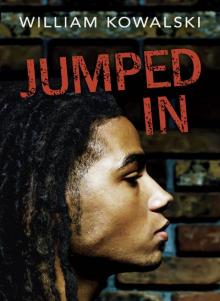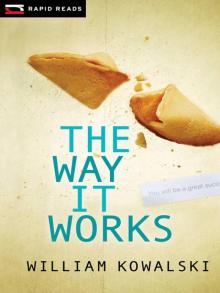- Home
- William Kowalski
Eddie's Bastard Page 32
Eddie's Bastard Read online
Page 32
We stood in the churchyard, Grandpa and Mildred and I, having come straight there from the bus station. Before us was a freshly filled-in grave; the tombstone wouldn’t be placed until the earth had settled. I’d missed the phone call informing Grandpa of Connor’s death. I’d also missed the wake, the funeral, and the burial service; and now all these things were over and Connor was in the ground, and there was nothing I could do about it.
“I had no way to get in touch with you,” Grandpa said apologetically. “And if I had I might have just let you alone till you got back anyway. I didn’t want to ruin your first trip outside of Mannville for a funeral. And Connor wouldn’t have wanted that either. Especially for his own funeral. Waste of time, he would have said. He would have preferred we just drop him in the Lake without any funeral at all, but you can’t do that, of course. Against the law.”
I was unable to speak.
“I hope you think I did the right thing,” said Grandpa. “Not calling you, I mean.”
“Annie doesn’t have a phone anyway,” I said. I was staring hard at the newly turned earth. “There was no way for you to find me.”
“I know this is sudden for you, boy,” said Grandpa. “It was for everyone. The whole thing.”
Mildred, acutely aware, it seemed, of having recently walked in on a story that had already greatly unfolded, remained respectfully silent. One thin, birdlike hand reached out to take mine, and she squeezed it for a long moment before she let it drop again.
“He never knew what hit him,” Grandpa went on. “The docs at the hospital said it was sudden, whatever it was. He’d left explicit instructions with them some time ago that he didn’t want an autopsy. Said once he was gone it didn’t make much difference how he went. But they think it was a massive stroke, a brain hemorrhage or something. His wife found him in his examination room. He was sitting at his desk, writing.”
Writing. I squeezed my temples in my hands. The sun was nearly down, and the wind was cold and biting, though not nearly as cold as it had been in Montreal.
“How many people came to the funeral?” I asked.
“Whole damn town,” Grandpa said proudly. “Even folks that owed him money.” He straightened up and blew his nose. “I’m glad you visited him so much. I think he enjoyed talking to you.”
“He was helping me,” I said. “I don’t see what he got out of it.”
“You’ll get it when you’re old like us,” said Mildred. “Nice to have young folks around.”
“At least you made it up with him,” I said to Grandpa.
The sun was completely down now, the sky overcast and seeming to loom just a few feet over our heads. I heard a clattering sound and realized it was Mildred’s teeth knocking together. Then I heard another sound, a snuffling kind of sob, and I realized that Grandpa was, if only for a second, crying.
“Yeah. And now let’s get home,” said Grandpa. “This weather is just plain obnoxious.”
Before we got back in the Galaxie I scooped a small handful of earth from the grave, tore a sheet from my notebook, and twisted it up with the dirt inside. I held the little package carefully on the slow ride home. It was exactly the sort of gesture Connor would have disdained making. “Ah, yes, venerate the sacred dirt,” I could imagine him saying. “Never mind the fact that the rest of New York State is covered in billions of square feet of exactly the same stuff. Next thing you know they’ll be erecting statues of me in the town square. Ridiculous. What good was I, anyway? I never even reproduced.” But I needed it; I needed some kind of talisman. I’d missed the wake, missed the funeral, and most of all I’d never gotten the chance to ask him the questions I’d been formulating on the bus. I needed, at least, a small handful of the earth surrounding his body to remind me of him.
It was beginning to snow. Large soft flakes hit the windshield audible blows. In the morning Connor’s grave would be covered with an inch or two of fine white frosting, and because it had no headstone, it would be invisible. Nobody would be able to find it until spring. It would be, to all appearances, as if he never was at all.
11
Doctor Connor’s Letter, in Which Much Is Explained; I Visit Henry Hutchins
Dear Billy,
By the time you read this letter, I will be dead. I don’t know when that will be, of course, but it can’t be too much longer now. I have seventy-two years under my belt, which is not so many by modern standards, but certainly more than enough by my own. I didn’t think I would live even this long. Six months ago I suffered a mild stroke, which I told no one about because it didn’t seem to harm me greatly; really, it was nothing more than a slight headache, but I recognized the signs. Last month I had another one. Then I knew it was only a matter of time. My father died in much the same way, having little strokes one after the other, until a big one sneaked up on him finally and carried him off. I know full well that I will go the same way, and that it will be happening shortly. I am resigned to it. Curious, even. I’ve always regarded death as a great adventure, and I must admit frankly, I’ve been excited about it for quite some time. I have both a clinical interest and a spiritual curiosity in what lies on the other side of this life. But I have some items of business to attend to before I go, and writing this letter to you is one of them, because there are some things I need to tell you that may help you in your quest to become who you are.
In late summer of 1970, very early in the morning, a pretty young woman whom I didn’t recognize came to my office. I mention that I didn’t recognize her because that was unusual—strangers almost never come through this town, as you well know. I’ve had the same patients for years, and there is hardly a person in Mannville I haven’t seen naked. This young woman was a complete stranger, however, and what was more, she was in the final stages of pregnancy and had just begun having contractions. It was about five-thirty in the morning. She pounded on the door for me to let her in, and, when I did, told me that she was about to have a baby, and furthermore she intended to have it here, in my office. She’d been walking to the hospital, but realized she wasn’t going to make it—the contractions were coming too strong and too close together—and as chance would have it, she happened to be right in front of my office when this fact became apparent. I offered to drive her to the hospital myself, but she was vehement in her refusal. Fate, she said, had decided when and where she was going to have the baby, and she believed in following the dictates of circumstance, not creating them. She was, in fact, what you call a “hippie,” one of the few ever seen in Mannville. She wore a fringed leather jacket and had long brown hair, and she was quite lovely. She told me—and this is the only fact she willingly volunteered—that her name was Sky.
“Come now,” I said. “Nobody names their child Sky. Surely you must have had another name at one point. What was it?”
So she told me her birth name—Eliza.
Eliza had another objection to going to the hospital, one she didn’t tell me but that I deduced rather quickly. She knew that in the hospital, with all the forms one had to fill out, she had much less chance of keeping her identity a secret. This was of the utmost importance to her. Being an experienced doctor, it didn’t take me long to figure out what the story was. She was unmarried, the father of her baby was obviously not present, and therefore she wanted her pregnancy to be kept a secret—probably from her family, who no doubt would disapprove of the whole business. It’s an old story, one I’ve witnessed repeatedly in my career, with infinite variations on the same theme. I also knew without being told that her coming to my office was not as much of an accident as she wanted me to believe, for I had—and still have—a reputation as a doctor who will help young girls in trouble, and who will do it for free, if necessary. There is a subculture of the illegitimately pregnant. Word gets out, and when girls around here find themselves in trouble, eventually my name comes up. I do prenatal exams for free, and Eliza would not be the first woman to deliver a baby right here in my office. If a woman is having a baby, who am I to tu
rn her away just because she hasn’t any money? It would go against everything I believe in. It may surprise you also to know that I have performed numerous abortions in my day. My reasons for this should already be known to you—you know how I feel about overpopulation. I do feel a certain sadness during the procedure, of course, but that’s just my own selfishness. I think my moral obligation extends further than the individual. I am more concerned with ensuring that a baby will have a happy life, with the chance for a happy future. There seems little point in introducing a new person to the world if nobody can help him get started in it. But my assistance to women is not limited to abortions, or to free obstetric services. There is, in fact, nothing I will not do to help a panicked young mother bring her child along. I didn’t become a doctor for money. I did it for humanity’s sake.
Eliza was too far along for an abortion, of course, and I was certain that if she’d wanted to have one she would have done so earlier. In the few minutes I’d known her, she had already struck me as very strong-willed and independent, entirely capable of making her own decisions and following through with them. This suggested to me that since she wanted the baby to come into the world, perhaps she had some means of assuring it would have a decent chance for success. But she also must have known I wouldn’t ask any questions. That seemed very important to her. She wanted nobody to know her name. It was only with the greatest reluctance that she told me her real first name, and she begged me to keep it a secret. On the subject of her family name, she remained unmovable, and after one or two vain attempts to get her to divulge it, I let the matter rest.
I rang upstairs and told my wife I would be needing her assistance. She and I prepared the birthing room, made young Eliza comfortable, and settled down to the long business of waiting. Birthing is, for the most part, a waiting game. It can go on for hours. This is precisely what happened in Eliza’s case. I changed the sign on my front door to read THE DOCTOR IS OUT, so nobody would wander in. My regular patients could go to the hospital if they were having an emergency. I timed Eliza’s contractions with one hand on her belly and the other holding a stopwatch. While we were waiting, I asked her some questions on the pretext of needing a medical history. Thus I discovered that she was twenty-three, that this was her first pregnancy, and that she was not from New York State.
“And the father?” I asked. “What do you know about him?”
“He’s dead,” she told me, her eyes welling up with tears. “He died in Vietnam.”
“I’m sorry,” I said, and I meant it. I had strong objections to our involvement in the Vietnam conflict. There is nothing sadder to me than a young mother bringing her child into the world alone, and there were many children in America without fathers because of that stupid war. “Do you have friends to help you once the child is born? Or family?” I asked her.
She shook her head—unable to speak at the moment because a particularly strong contraction had just begun and she was trying not to cry out. She was brave and tough, and already I was developing a great respect for her. When the contraction was over, I asked her, “Were you very close with him?”
She laid her head back on the pillow. “He was beautiful,” she sighed. I was silent. I hadn’t asked her what he’d looked like; I sensed, however, that she wasn’t referring to his appearance, but to some general quality he possessed. And I was right, for a moment later she went on, “He was totally right on. Totally clear. He just zoomed in on you in an instant. No head games, no power trips. His soul was clean. And old.”
I translated this in my head. Her description, once I decoded it, sounded familiar. A few bells were starting to go off in my head.
“Was he from here?” I asked. “From Mannville?”
But she couldn’t answer because another contraction was gripping her. I felt her cervix; it was fully dilated. She was ready to start pushing.
Mrs. Connor and I stayed with her all that day and into the evening. She dilated around noon, I remember. It was a long and difficult labor, and several times I wrestled with the question of whether I should have her transported to the hospital. But when I ventured to broach the subject to her again, she remained adamant in her refusal.
“This baby is going to need to be strong in his life,” she said, her speech, under duress, becoming free of slang. “Better to find out now if he’s got what it takes to make it.”
That was the last time I asked.
She delivered the baby at around six o’clock that evening. It was a boy, nineteen inches, seven and a half pounds. The labor nearly killed her, and the baby too. Mrs. Connor cleaned him off and got him breathing while I stitched up young Eliza and got her cleaned up. I’d had to perform an episiotomy, which is normal during a woman’s first delivery, and there was blood everywhere.
Eliza and her baby stayed for nearly six weeks—she confessed she had nowhere to go, and we were more than happy to let her stay with us. Despite her reticence, she was very likable. We gave her one of the guest rooms upstairs. Her recovery was rapid, and the baby, after the initial shock of his difficult arrival had worn off, showed every sign of a strong constitution.
Eliza begged us not to tell anyone of her existence. Seeing as how she was completely helpless, my wife and I respected her wishes, though of course we were curious. We were also perplexed by the fact that she hadn’t given the baby a name. When we asked her about this, she said that it wasn’t for her to decide what the baby would be called. She would leave it up to those who would know him better.
“I don’t like this,” said Mrs. Connor. “There’s something strange going on.”
“I know,” I said. “But it’s none of our business.”
“I’m having a hard time remembering that,” my wife replied. I thought I knew what she meant. She felt she was at least entitled to know what the real story was, after all we’d done for the young mother and her baby son.
“We promised we would never ask for payment of any kind from girls like her,” I reminded her. “That includes information too. If she doesn’t want to tell us, she doesn’t have to.”
“Well, I can still ask her,” said Mrs. Connor.
It was then I did something I had never done to my wife before, and have never done since: I gave her an order.
“You are absolutely forbidden to ask her anything at all,” I said. “If you can’t do that, then you are to stay away from her.”
Needless to say, my wife never quite forgave me for that. I wasn’t just being difficult, however. I was reminding her of a promise we’d made. She seemed to want to forget about that promise, and of course I knew why—she was becoming attached to the baby, and didn’t want him to go. Neither did I.
When Eliza was finally ready to leave, to my astonishment she produced a wallet full of cash.
“How much do I owe you?” she asked.
I did some calculating. At regular rates, including medical fees, groceries, and the price of a room, her bill would have come to something like three thousand dollars. I hadn’t any intention of asking her for money, of course, but I did take the step of conferring with my wife, to get her opinion on the matter. She was in agreement with me—she usually was, which was why we married in the first place; we felt the same way on most subjects. But my wife wanted to take things one step further.
“Tell her we’ll forget about money if she just tells us about herself,” she said.
“That’s blackmail!” I protested.
“It’s not blackmail,” retorted Mrs. Connor. “It’s insurance. I have a feeling this information will come in handy someday.”
“What are you talking about?” I asked her.
“It’s just a feeling,” she repeated. And I’m sorry to say that since my wife was able to give me no solid, rational reason for wanting to know more about Eliza, I contravened her will and told Eliza she didn’t have to give us any money, nor did I ask her any more questions. This appeared to give her some relief. I had suspected it would. I knew she wouldn’t stay around Mann
ville, and she would need the money to get wherever she was going. As I said before, I didn’t become a doctor for money. And somehow I knew we wouldn’t get any more information out of her. My wife never forgave me for this either, and as it turned out, she was right. This information would have come in handy later, simply for the sake of satisfying the natural human urge to know something of one’s origins.
The day Eliza left with her baby, Mrs. Connor sat in the kitchen and cried. This was unlike her, but I wasn’t surprised. I was moved to tears myself. We had grown very attached to the young woman, despite her air of mystery, for it was obvious that she was well bred, and we admired her grace and strength. We’d also grown attached to the baby. Mrs. Connor and I had agreed even before we were married that children were not for us. She had her reasons, and I had mine, and though they were not the same reasons, our goals were identical, and things seemed to work out fine. But you can’t watch a baby being born, and spend the next month and a half watching him grow, holding him and changing his diapers and cooing and clucking and doing all the things people do with babies, without feeling a strong bond. Eliza’s departure was difficult for both of us.
Her last words to us were of thanks. “You’ve helped bring a little man into the world,” she said. “A wonderful little man.” And she was gone.
As things would turn out, however, we had misunderstood her. What she was saying was not “a wonderful little man” in the sense of a fine boy-child. She meant—and I’m sure you’ve deduced this by now, Billy—“a wonderful little Mann.” For this baby was you, William Amos Mann IV, and Eliza was your mother.
The very next day, your grandfather came marching into my office with a baby in a picnic basket. I was hard-pressed to conceal my astonishment, my joy, my general excitement, for I recognized the baby immediately as Eliza’s. A few questions sufficed to prove to me that your grandfather knew nothing of the mother. It was obvious to him, however, that the father had been Eddie, his own son. Once he pointed that out to me I could have kicked myself for not recognizing it sooner. And I knew you were Eliza’s baby because of a birthmark on the back of your head. You probably don’t know you have it. It’s just above your hairline, between the two tendons at the back of your neck, and it’s about the size of a quarter. If you were to cut off your hair, you would find it exactly where I’m describing it.

 The Good Neighbor
The Good Neighbor Eddie's Bastard
Eddie's Bastard Jumped In
Jumped In Something Noble
Something Noble The Adventures of Flash Jackson
The Adventures of Flash Jackson Just Gone
Just Gone The Way It Works
The Way It Works Epic Game
Epic Game